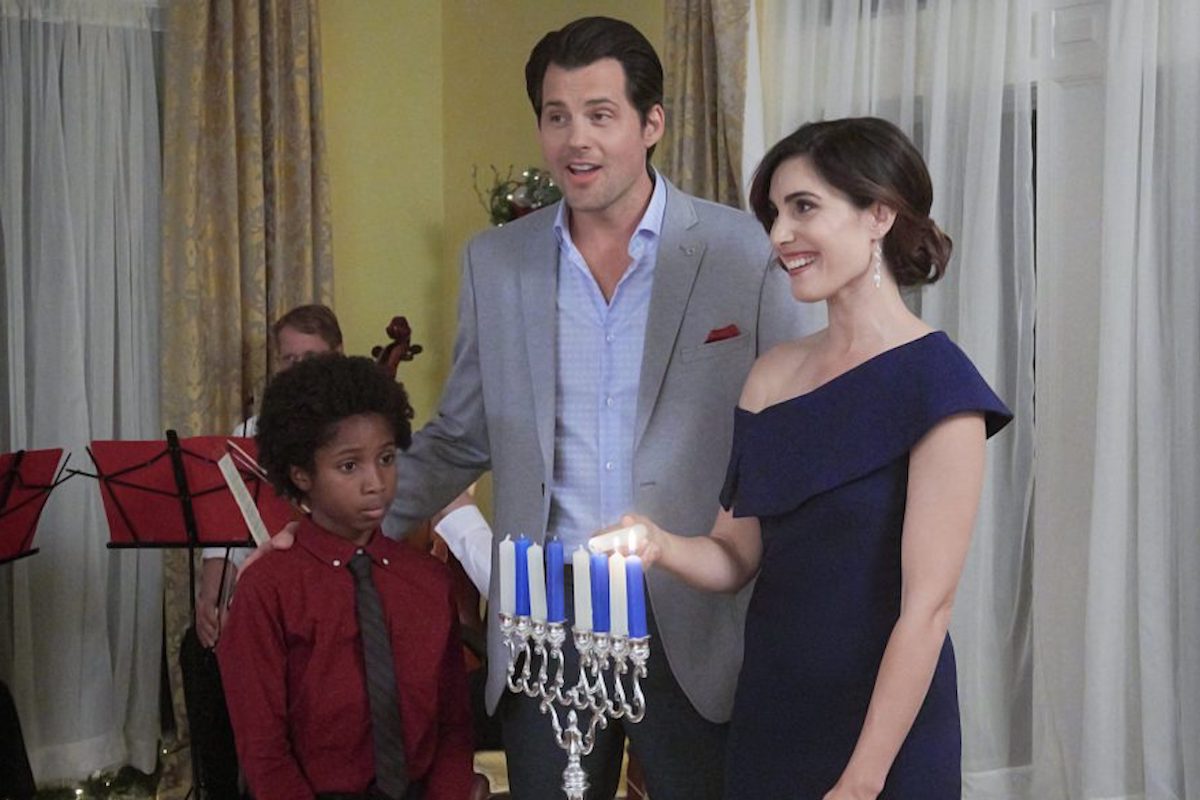This year, Hallmark and Lifetime decided to incorporate Hanukkah into their Christmas movie genres with three new films: Mistletoe and Menorahs, Holiday Date, and Double Holiday. There’s been much debate over whether these are anti-Semitic, offensive, or just plain clueless. Well friends, I watched them all, and I can say Double Holiday is far and away the best and most respectful to all the holidays featured in these films.
Is the dialogue still forced? Absolutely. Does the plot have holes as wide as the splatter of oil on your counter after making latkes? Sure. But it’s got the most going for it out of all these terrible “Hanukkah” movies.
Just so I‘m totally clear from the start: Double Holiday is still bad. It’s a Hallmark movie, so it’s going to be dull, and it drags. At least Mistletoe and Menorahs was short — both the Hallmark movies clock in at two hours when you include commercials, despite the plot not warranting it. But, for the genre, I think it deserves some credit. And I’m here to say why.
1. The protagonist is a Jewish woman
This is a very good start. These movies are targeted at women, so having the main character, whom the audience is most likely to see as a stand-in for themselves, be a Jewish woman, is important. In the other two films, the Jewish character is the male love interest, and it means the audience relates to the Jewish character more distantly.
2. Rebecca (said Jewish protagonist, obviously) is career driven, but not really in the way these movies typically depict.
First off, she doesn’t work in an industry you typically see in rom-coms — why do they think everyone works in magazine publishing? (Okay, ignore the fact that I work in *digital* magazine publishing.) Her job is actually pretty boring, which I kind of love! (She’s a project manager in real estate development. Yawn to me, but I don’t want to yuck anyone’s yum.)
Yes, much of the way her work is depicted seems very unrealistic — the tension of the movie is about her having to plan a job-related holiday party with help from her non-Jewish co-worker whom she doesn’t really like. However, the movie does make reference to her having other work projects, unrelated to the main one they are focused on, and I liked that because that feels real — like, hey, she has a job that obviously includes more work than just this one project!
Also, Rebecca is focused on getting a promotion, and the movie doesn’t try to undermine that, or try to make you think that she should instead be focused on what “matters” (i.e. falling in love). Getting that promotion does matter — and she is good at her job! For what it’s worth, Mistletoe and Menorahs also centers around a job and the promise of a promotion, but the lead works in toy sales and I just feel like that’s one big Big knock-off.
3. They get some of the Jewish stuff right!
Okay, only some. Let’s start with what works:
The Jewish family reads pretty accurate to me. When they begin to talk over each other, it tracks. When they bring Chinese food one of the nights that they gather during Hanukkah, I thought, yes! Because you know, we don’t actually eat latkes and sufganiyot every night of Hanukkah (though I did just eat latkes every night for the last four nights, so who am I to judge?).
They say the blessing correctly for the menorah, and they show them doing it each night! They do not, however, mention the second blessing, only the first one. (In Mistletoe and Menorahs, they do say both blessings, albeit never the same night. So, on that front, it’s a wash on who got it “more” right.)
4. The non-Jewish love interest is genuinely interested in Jewish traditions — and getting Rebecca to embrace her identity.
He doesn’t “other” her, or exoticize her Judaism, which they do in Holiday Date and Mistletoe and Menorahs. The sharing happens naturally: No one is giving someone a lesson; he’s just there when they happen to be doing their family traditions. And he gets into it — he make latkes, he lights the menorah, and he even does an impressive upside dreidel spin.
In the other two films, they emphasize how much they each teach each other about their holiday traditions. This is BS, because Christmas is the dominant tradition, so someone acting like they don’t know anything about the most celebrated holiday in the US doesn’t ring true! Instead, he helps her embrace the side of herself that emerges when she celebrates her heritage with her family.
Okay, now on to what doesn’t work in this movie:
1. Tokenism is on full display, including a person of color as the sidekick who only exists to support Rebecca. Not a good look, Double Holiday! At least in Mistletoe and Menorahs, the white lead helps her POC co-worker get a promotion.
2. Rebecca claims she was on a dreidel-winning streak in her family’s annual “dreidel competition” that gets very competitive. Sorry, but do they know how the game of dreidel actually works? It’s a game of luck requiring no real skill aside from the ability to spin a dreidel, and I’ve never seen someone play more than 20 minutes (unless they turned it into a drinking game…)
Am I proud of myself for watching all three of these movies? Not really. Will I watch any new ones that come out next year to see how much they get right and wrong? Absolutely.
Header Image via 2019 Crown Media United States LLC/Albert Camicioli



